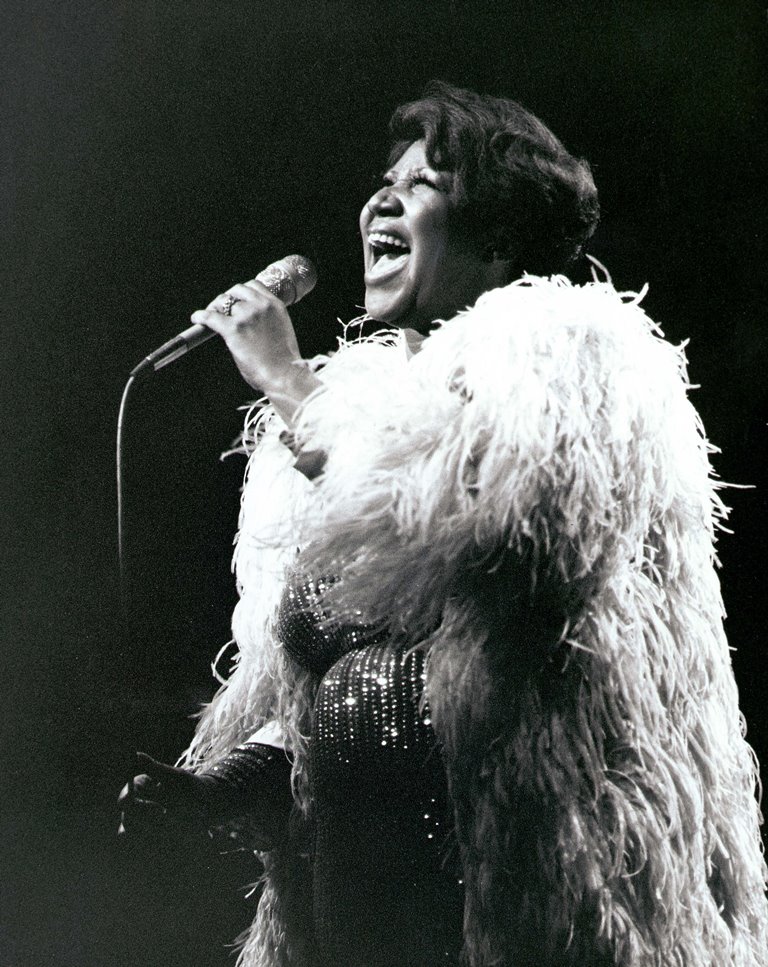The Gospel of Aretha



The church gave us Aretha Franklin. No matter how you feel about religion, no matter what church you grew up in or didn’t, that is a fact. Aretha Franklin, Queen of Soul, is synonymous with spirituality. Studies say that this generation is less spiritual than the last and that we’re done with religion. While that may be true (less so for black millennials), we grew up in a time when Aretha’s music was ubiquitous – her songs our hymnals, her voice our scripture. In the past 24 hours, there has been no denying the impact the gospel of Aretha Franklin had on her peers, her successors, her generation, the ones after it and, specifically, black women.
Aretha’s catalogue is so sprawling, it’s intimidating. In fact, I’m embarrassed by how much I discovered about Aretha after reading every obituary I could find yesterday considering her voice has been one of the most constant things in my life. We should all be a little bit embarrassed that we’ve taken Aretha Franklin for granted for all of the years that she was RIGHT THERE. There were things I didn’t know about Aretha, like how she demanded to be paid upfront in cash at every gig and she’d keep the money in her purse with her on stage during her performance (a resourceful and cautious Queen), but I do know every timbre of her voice. I know that hearing the first few bars of “I Never Loved a Man The Way I Love You” feels like the sonic embodiment of a Sunday morning.
The one thing I know for sure is that Aretha Franklin was a genius. Buzzfeed’s Tomi Obaro wrote a beautiful piece about Aretha’s genius and called out the reluctance people tend to have when attaching that prestigious label to black women. It’s a sentiment Lainey also wrote about back in June after Beychella. Beyoncé also often gets left out of the genius conversation. Here’s Tomi on why calling black women artists, like Beyoncé and specifically Aretha, is so necessary:
Acknowledging the musical genius of black women artists is important, not only as a source of respect but as a way to open the canon and see the ways in which black women, who are often viewed as mere ornaments in their own industry, have shaped music with their own surreal talent and aptitude.
Aretha’s talent was surreal. Her music feels personal and private. Growing up, I don’t think I talked about my love of Aretha with anyone, except for my mom. She wasn’t the artist you listened to in groups with your friends. Aretha is headphones-on, curl-up-in-bed, me-time music. She takes you to church, not just in the physical sense or the praise-hands emoji way either. Aretha’s music is soul-reconstructing, it was that new age self-care sh-t before self-care was a thing. Aretha Franklin did goop better than Gwyneth ever will. In a group chat with a few of my girlfriends, I asked what Aretha meant to them. They each referenced Sundays or heartbreak. Another friend said that Aretha’s music felt spiritual because Aretha made her feel proud of her black body, her femininity and her strength, even when her church didn’t.
Aretha Franklin’s father, CL Franklin, was the most famous Baptist preacher of his day and he groomed her to be a gospel singer. She was raised in pews, belting out impossible runs from beside her daddy’s pulpit. She went on to sing “secular” music about romance and sex and female empowerment but somehow, her songs still felt spiritual. In Aretha’s words, “I never left the church". In my 66-year-old Jamaican mom’s words, “I never felt guilty listening to Aretha’s secular music because you could still feel the reverence.” My mother loves Jesus almost as much as she loves Aretha Franklin. Last night on the phone, she went off on how much she loved Aretha and how much Aretha helped her love.
“My generation fell in love with Aretha, fell out of love with Aretha, broke up with him with Aretha, cussed him out with Aretha.”
There really is an Aretha song for every mood, especially the ‘cussing him out’ mood. Aretha Franklin’s “Respect” is one of the first songs I ever remember hearing. My mother’s love of Jesus meant that I grew up in churches, reciting the Bible and going to Sunday School but I remember every Aretha lyric more than I remember the book of Psalms or theology. “Respect” is one of the songs that makes Aretha’s genius title undeniable.
“Respect” was originally sung by Otis Redding and it was a love song. Aretha rearranged it and added, “R-E-S-P-E-C-T/ Find out what it means to me” and the “sock it to me” repetition (so, the best parts?). She took it from a song lamenting love to a rallying cry for the civil rights movement. “Respect” became a declaration of feminism. Aretha upgraded it to a powerful anthem that hasn’t lost its relevance 50 years later. Otis Redding stayed mad that Aretha hijacked his song. I love that story.
Spirituality isn’t supposed to be political, separation of church and state and all, but Aretha didn’t care. She was following the lead of the black churches she grew up in Detroit which according to NPR “used their churches to launch the campaign of Detroit's black political class". Aretha Franklin was a black woman in the ‘60s and ‘70s in America using her voice and her financial privilege to uplift her community. Another amazing thing I learned about Aretha yesterday? She offered to post black power activist Angela Davis’s bail when she got arrested.
one of my absolute favorite things to remember about aretha franklin is how she cared about angela davis and followed her case and posted bail for her. from jet magazine, december 3, 1970. pic.twitter.com/Cqa0XvuaY4— #PettyPendergrass (@ashoncrawley) August 13, 2018
Aretha said, “I have the money, I got it from black people — they've made me financially able to have it and I want to use it in ways that help our people."
Aretha Franklin was that OG. And that’s just a taste of how much Aretha did for her community. Put some R-E-S-P-E-C-T on her name. (I’m sorry, I had to.) Aretha also never left the church but she made sure to show the subtle ways in which she was progressive and inclusive. She performed at a gay wedding in 2011. And this is a great piece from Myles E Johnson about how Aretha was “A Radical Affirmation For Queers of Color”. Least importantly or most, depending how petty you are, Aretha was also The Queen of Shade.
So you can only reach Auntie status if your shade and truth level sync up. Here, Ree-Ree gave us our finest example pic.twitter.com/NVSeeQH9TK— Jemele Hill (@jemelehill) August 16, 2018
That is my favourite clip on the Internet.
In the past 24 hours of sifting through Aretha’s life and legacy, I can’t stop thinking about how she’ll live on. As someone who grew up with religion, I think there is comfort in believing in an afterlife but I’m more interested in how Aretha is already living on through her work. When I wrote about Nicki Minaj earlier this week, I casually mentioned that the only Queen I recognize is Beyoncé. Beyoncé wouldn’t be the Queen without THE Queen. Beyoncé exists because of Aretha Franklin. When Beyoncé sang the black American national anthem – the blackest GOSPEL song of all black gospel songs – at Beychella, Aretha paved the way for that moment. She paved the way for Whitney (RIP), Mariah, Jennifer Hudson, Mary J. Blige, Alicia Keys, and so many more. She lives on in every black woman performer who gets up on stage and sings from her soul.
Aretha lives on in every season of a reality TV singing competition show when someone attempts one of her songs. Kelly Clarkson owes her entire career to Aretha. She lives on through all of the moments in pop culture when her music infiltrates a scene and weaves its way into the subconscious of a young person who will pass it on to another generation. She lives on in all the songs we’ll be playing on repeat for the foreseeable future, especially on Sundays.
The church gave us Aretha Franklin and in return, Aretha gave us everything.
